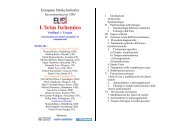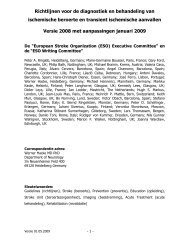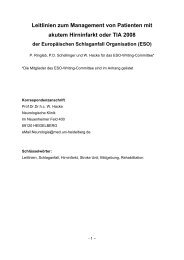Guidelines for Management of Ischaemic Stroke 2008 - ESO
Guidelines for Management of Ischaemic Stroke 2008 - ESO
Guidelines for Management of Ischaemic Stroke 2008 - ESO
You also want an ePaper? Increase the reach of your titles
YUMPU automatically turns print PDFs into web optimized ePapers that Google loves.
<strong>ESO</strong>-<strong>Guidelines</strong> <strong>for</strong> <strong>Management</strong> <strong>of</strong> <strong>Ischaemic</strong> <strong>Stroke</strong> <strong>2008</strong><br />
It is recommended that low-dose aspirin may be considered in men <strong>for</strong> the<br />
primary prevention <strong>of</strong> myocardial infarction; however, it does not reduce the risk<br />
<strong>of</strong> ischaemic stroke (Class I, Level A)<br />
Antiplatelet agents other than aspirin are not recommended <strong>for</strong> primary stroke<br />
prevention (Class IV, GCP)<br />
Aspirin may be recommended <strong>for</strong> patients with non-valvular AF who are younger<br />
than 65 years and free <strong>of</strong> vascular risk factors (Class I, Level A)<br />
Unless contraindicated, either aspirin or an oral anticoagulant (international<br />
normalized ratio [INR] 2.0-3.0) is recommended <strong>for</strong> patients with non-valvular AF<br />
who are aged 65-75 years and free <strong>of</strong> vascular risk factors (Class I, Level A)<br />
Unless contraindicated, an oral anticoagulant (INR 2.0–3.0) is recommended <strong>for</strong><br />
patients with non-valvular AF who are aged >75, or who are younger but have<br />
risk factors such as high blood pressure, left ventricular dysfunction, or diabetes<br />
mellitus (Class I, Level A)<br />
It is recommended that patients with AF who are unable to receive oral<br />
anticoagulants should be <strong>of</strong>fered aspirin (Class I, Level A)<br />
It is recommended that patients with AF who have mechanical prosthetic heart<br />
valves should receive long-term anticoagulation with a target INR based on the<br />
prosthesis type, but not less than INR 2–3 (Class II, Level B)<br />
Low dose aspirin is recommended <strong>for</strong> patients with asymptomatic internal carotid<br />
artery (ICA) stenosis >50% to reduce their risk <strong>of</strong> vascular events (Class II, Level<br />
B)<br />
Low-risk subjects<br />
Six large randomized trials have evaluated the benefits <strong>of</strong> aspirin <strong>for</strong> the primary<br />
prevention <strong>of</strong> cardiovascular (CV) events in men and women (47,293 on aspirin,<br />
45,580 controls) with a mean age <strong>of</strong> 64.4 years [259-264]. Aspirin reduced coronary<br />
events and CV events, but not stroke, CV mortality, or all-cause mortality [265]. In<br />
women, aspirin reduced stroke (OR 0.83; 95% CI 0.70-0.97) and ischaemic stroke<br />
(OR 0.76; 95% CI 0.63-0.93) [266]. In a separate study in 39,876 healthy women<br />
aged 45 years or more, aspirin reduced stroke (RR 0.83; 95% CI 0.69-0.99) and<br />
- 34 -





